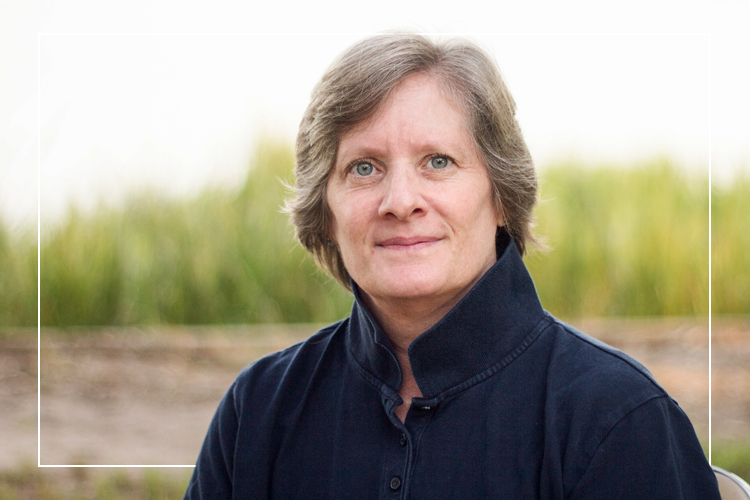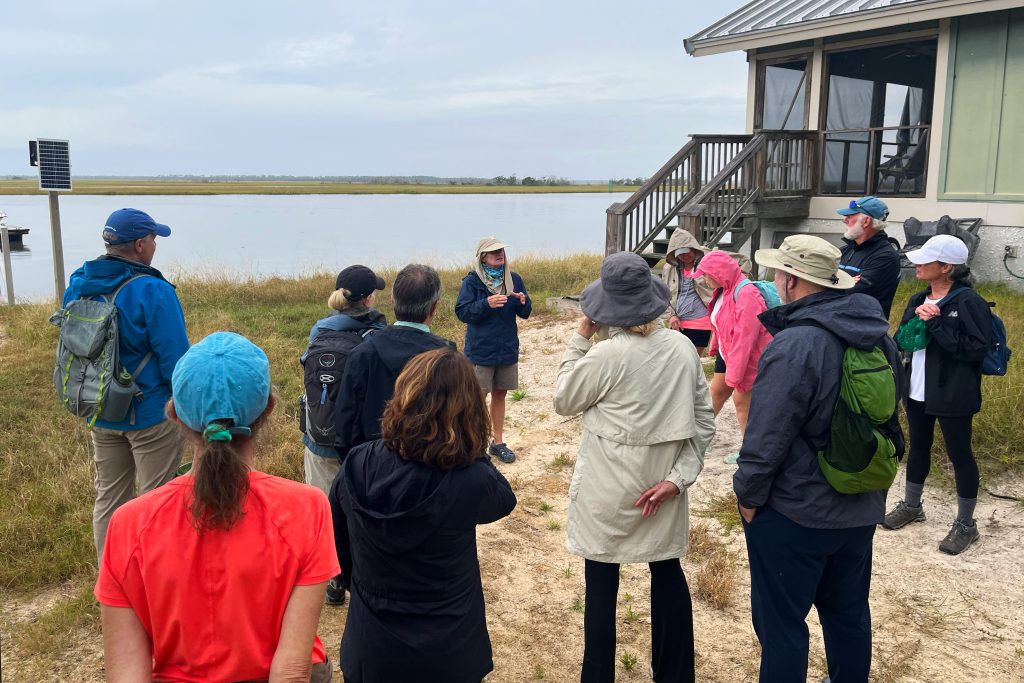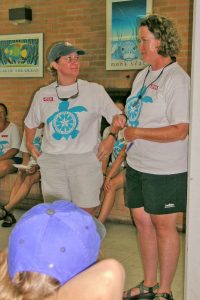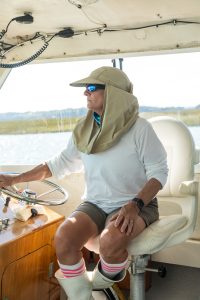For two decades, marine educator and boat captain Dodie Sanders cultivated connections between coastal communities and the natural world by creating science-based educational programming for K-12 students and adults. In November 2022, Sanders retired from her role at UGA Marine Extension and Georgia Sea Grant, leaving a lasting impact on thousands of students, educators, coastal residents and researchers.
Sanders began working at Marine Extension and Georgia Sea Grant in 2002. Based at the UGA Marine Education Center and Aquarium on Skidaway Island, she developed engaging curricula, programming and workshops offered year-round at the facility on topics like oyster restoration, marine debris monitoring and horseshoe crab ecology. She mentored and trained hundreds of marine education fellows and college interns, fostering their growth in environmental education and marine science.
Early on, her work brought prominence to UGA on a regional and national level. In 2003 she helped launch G.E.O.R.G.I.A. (Generating Enhanced Oyster Reefs in Georgia’s Inshore Areas), the first oyster shell recycling program in the state. The community-based program focuses on collecting and recycling oyster shell to create new oyster reefs and enhancing public awareness and stewardship of oyster habitat. Its success led to new projects tied to oyster restoration, including hands-on fishing programs for youth that made the important connection between the conservation, restoration and protection of oyster reef communities and coastal fisheries.
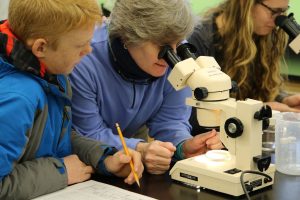
Sanders looks through a microscope alongside a student during a program at the UGA Aquarium.
Between 2007 and 2014, Sanders developed and hosted a series of workshops for hundreds of educators to support the growing need for teacher training opportunities. Educators traveled from as far as New Hampshire to participate in workshops on the Georgia coast that focused on horseshoe crab ecology and marine debris. The workshops were rooted in field-based explorations that used the environment as context for learning, and teachers were able to gain new skills, knowledge and techniques to take back to their classrooms.
“A day on the water with Dodie is good medicine,” said Anne Lindsay, associate director of education for Marine Extension and Georgia Sea Grant. Lindsay shares a 20-year history with Sanders, working alongside her to provide hands-on, experiential learning opportunities at the aquarium.
“She has, quite simply, raised the bar on the quality and research content of our field and lab programming and outreach to classrooms and the community,” Lindsay said. “She’s been the link to current research being done along Georgia’s coast and speaks the language of science and education equally well.”
Sanders has been fundamental in bringing science-based information to coastal communities. Her passion for research helped build the connection between Marine Extension and Georgia Sea Grant and researchers at UGA Skidaway Institute of Oceanography. This partnership led to the development of public exhibits at the UGA Aquarium as well as programs and resources designed to make research findings understandable and accessible.
In 2018, Sanders teamed up with professor Jay Brandes at the Skidaway Institute to develop a microplastics monitoring community science program to engage the coastal community in studying the abundance and distribution of microplastics along the coast.

“Dodie was able to entice a series of volunteers to work for us to collect and measure microplastics in the area,” said Brandes. “She also gained funding for supplies, internship funding, and boat trips that greatly expanded our program.”
Between May 2018 and January 2020, volunteers collected 2,880 samples from various locations on the coast. Data they collected generated a map of microplastic abundances and types used by coastal zone managers and municipalities to identify hot spots of contamination for future planning and decision making.
“She made the drudgery of filtering the numerous samples we would get from all the water sampling sites of the microplastics project feel like fun,” said Roger Cayer, a volunteer who participated in the microplastics monitoring program as well as other community-science programs launched by Sanders over the years.
“Working with Dodie helped me realize how much I enjoy being a citizen scientist,” Cayer said.
Sanders incorporated findings from the project into lab and field activities for K-12 students visiting the aquarium and published an article about the program in the 2021 issue of Current: The Journal of Marine Education with the goal of inspiring scientists across the country to use it as a model for engaging communities in research.
“Involving volunteers provided direct experience with all of this, which made a strong impact on them, and all of their friends and families,” said Brandes.
A theme woven throughout the projects and programs Sanders launched over the years is the focus on action-based conservation, education and research efforts that bring diverse audiences together with a common cause and goal.
Sanders has inspired people of all ages to look at the natural world from a new perspective, fueling a passion within others to study, protect and explore it, including her colleagues at Marine Extension and Georgia Sea Grant.
“Her role with us as captain, educator and researcher lies at the heart of our work,” said Lindsay. “She has inspired thousands of people and mentored a lucky subset, including all of us.”

The education team in early 2000 poses on the bluff outside the UGA Marine Education Center and Aquarium on Skidaway Island (left). Current staff pose for a group photo with Sanders on her last day in November 2022 (right).

